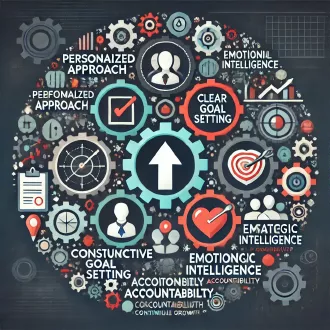Transcription Role of the leadership coach
In the context of workplace leadership coaching, the roles of a coach are essential in guiding employees toward their personal and professional development. There are key roles that leaders/coaches play to achieve effective results in coaching sessions.
These are:
- Coaching to develop other leaders: it is increasingly common for organizations and companies to look to their own employees for the next generation of leaders. This role involves preparing individuals for leadership roles in the organization. These leaders may be managers, team leaders or department heads. The coach becomes a mentor who helps develop skills and competencies critical to successful leadership. This may include skills such as effective communication, decision making, time management and conflict resolution. The coach provides practical tools and strategies that leaders can apply in their work environment.
- Coaching to improve performance: This has its roots in the rise in popularity of coaching in the business world. As more research was done on the outstanding achievements of certain leaders and employees, it was realized that they were often attributed to the influence of a coach. This form of coaching focuses on empowering individuals to reach their full potential and achieve the best possible results. The coach collaborates with coachees to identify areas for improvement and set goals for growth, providing a structure for achieving concrete and measurable results.
- Coaching for learning and development: In this role, coaches use questions and alternatives to stimulate reflection and self-discovery. This approach not only promotes sustainable learning, but also helps coachees explore new perspectives and learn to think for themselves. The coach establishes a safe and confidential environment for coachees to explore their strengths and areas for improvement.
- Coaching for transformation: A leadership coach is a strategic ally and in this role guides individuals and departments through significant changes. Adaptability is essential here, as coaches help coachees let go of the past and embrace a more powerful future. This is critical in times of organizational change. In this role, the coach is a promoter of positive change, helping coachees overcome resistance to change and adopt new approaches and behaviors that have a positive impact on their environment.
- Mentor and Guide: In this role, the coach shares his or her experience and knowledge to inspire leaders to make informed decisions and achieve successful results. They can draw on concrete examples, case studies or personal stories. In addition to sharing valuable information with their coachees.
role




